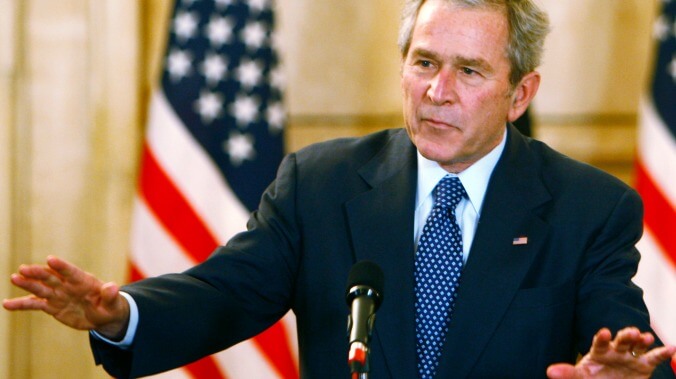We almost impeached George W. Bush, too

This week’s entry: Efforts to impeach George W. Bush
What it’s about: As the Senate voted to acquit Donald Trump based on lack of evidence, after refusing to allow any evidence to be presented, there were a lot of comparisons to the Clinton impeachment. Many of the same figures 21 years later said more or less the opposite of what they once said about how essential witnesses are to a trial and what constitutes “high crimes.” But we nearly had another impeachment in between. In 2008, 35 articles of impeachment against George W. Bush were introduced in the House of Representatives, but with only eight months remaining in his term, the Judiciary Committee chose to run out the clock instead.
Biggest controversy: When it comes to controversies, Bush was about quantity over quality. Rather than use the Pelosi strategy of focusing on one specific wrongdoing out of many, Representatives Dennis Kucinich and Robert Wexler, who introduced the impeachment resolution into the House, listed no fewer than 35 separate articles of impeachment. Charges ranged from very clear lawbreaking (torture, wireless surveillance), to incompetence (the response to Hurricane Katrina and ignoring repeated warnings in advance of 9/11), to broad dissatisfaction (undermining efforts to address climate change, misleading people “in an attempt to destroy Medicare”). The House was receptive to this slew of charges, voting 251-166 to pass them to the Judiciary Committee, but as the committee took no further action, we’ll never know how many of the 35 articles would have made it to the Senate, much less whether that body would have voted for removal.
Strangest fact: Even four states tried to impeach Bush. As early as 2006, New Mexico’s Democratic Party made impeachment and “lawful removal from office” part of its platform, while soon-to-be-Congressman Keith Ellison led the Minnesota House to pass a resolution to encourage Congress to impeach. The following year, Vermont Democrats introduced a resolution into the state legislature supporting impeachment, and in early 2008, New Hampshire’s House petitioned Congress to impeach, even claiming that Thomas Jefferson’s Manual Of Parliamentary Practice gave the states the right to begin presidential impeachment proceedings, though the manual is not legally binding, and the resolution died in committee.
Thing we were happiest to learn: Kucinich’s next impeachment effort was even less successful. Republicans frequently talked about making efforts to impeach Barack Obama, largely over conspiracy theories like Obama being born in Kenya or Benghazi, or perfectly legal behavior like signing the Affordable Care Act or making a prisoner swap with the Taliban. Kucinich got into the game, calling for Obama’s impeachment for making NATO-approved airstrikes into Libya during that country’s civil war. While no one took the call for impeachment seriously, Obama did call the failure to plan for a post-Gaddafi Libya the worst mistake of his presidency.
Thing we were unhappiest to learn: Some familiar faces took familiar stances in 2008. Nancy Pelosi, in her first stint as Speaker of the House, took impeachment, “off the table,” although sent the mixed message that she would “probably” advocate for impeachment were she not Speaker (i.e., the one person with the power to put impeachment into motion). Then-Representative Mike Pence unsurprisingly went to bat for Bush, hair-splitting that he hadn’t broken the law “in his own interest.” Then-Senator Joe Biden said he would support impeachment if Bush bombed Iran, as he apparently had a three-countries-you’re-out rule.
Best link to elsewhere on Wikipedia: In advance of an election that will be decided by questionably trustworthy electronic voting machines and recently purged voter rolls, it’s worth revisiting the controversial 2004 election, in which Republicans allegedly shredded Democratic voter registration forms; attempted to purge a secret list of (largely Democratic) voters from the Florida rolls; called likely Democratic voters with false polling information; and in the crucial swing state of Ohio, disqualified provisional ballots and set up too few voting machines in left-leaning districts (resulting in long lines, and as much as 3% of the electorate giving up before voting).
Further down the Wormhole: Bill Clinton actually was impeached, for the high crime of fooling around with a coworker. On the campaign trail for president in 1992, Clinton charmed voters by playing the tenor saxophone on The Arsenio Hall Show. Clinton had played the instrument since high school, likely unaware that its inventor, Adolphe Sax, also invented the saxotromba, saxtuba, and other instruments that have been largely forgotten. We’ll take a listen next week.